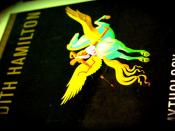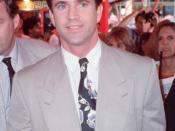Humans are mythologizing and "world-building creatures." We appropriate elements from our past and present to fashion epic narratives and myths for a variety of existential, sociological, and religious ends. Humans do not come into the world with a given relationship to it; we create our purpose and impose our significance upon the world.
James Ford, Ph.D.
Films, like stories, more often than not deal with universal truths which audiences can relate to. Fictional or not, films portray characters who become real as we identify with their fears and failures, sorrows and successes. Their story becomes our story, and history is entwined with the stories seen on screen. Myths come about, attempting to explain a culture's view of the universe and the nature of humanity.
Films tell the story of a people - a story which may have been sensationalized and ballooned to epic proportions throughout the course of its telling.
Intentionally or not, producers of films, as mentioned by Dermody and Jacka, resort to the so-called artistic license which smoothes out history and traps heroes in romantic images and legendary worship. No genre is excluded from this artistic license, be it a tragic love story, a famous person's biography or a documented military campaign. The difficulty of separating emotions from actual events gives rise to some inaccuracies in the eventual turnout of the film. Directors grab each opportunity to make the audiences cry, make them angry, make them cheer, to empower them with passion for these historical figures played on screen.
Myths need not necessarily be untrue - their origin is inevitably tied with real events which occurred in history. The problem arises when myths, as those in films, tend to simplify actual events which happened. History becomes a clear path leading to moral victory, with just...


